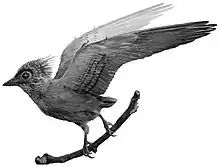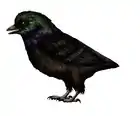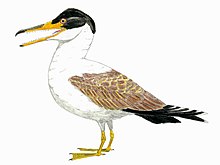| Bohaiornis Temporal range: Early Cretaceous, | |
|---|---|
 | |
| skull diagram | |
| Scientific classification | |
| Domain: | Eukaryota |
| Kingdom: | Animalia |
| Phylum: | Chordata |
| Clade: | Dinosauria |
| Clade: | Saurischia |
| Clade: | Theropoda |
| Clade: | Avialae |
| Clade: | †Enantiornithes |
| Family: | †Bohaiornithidae |
| Genus: | †Bohaiornis Hu et al., 2011 |
| Species: | †B. guoi |
| Binomial name | |
| †Bohaiornis guoi Hu et al., 2011 | |
Bohaiornis is a genus of enantiornithean birds. Fossils have been found from the Lower Cretaceous Jiufotang Formation of western Liaoning, China. The only known species, Bohaiornis guoi, was named by Dongyu Hu, Li Li, Lianhaim Hou and Xing Xu in 2011 on the basis of a fully articulated and well-preserved skeleton of a sub-adult. This specimen, LPM (Liaoning Paleontological Museum) B00167, preserved two long, ribbon-like feathers attached to the tail rather than a fan of shorter pennaceous feathers. It was similar to the slightly older Eoenantiornis, but much larger in size.[1] Bohaiornis is the type species of Bohaiornithidae, a family of large predatory enantiornitheans from the Early Cretaceous.[2]
In 2014, a second, even larger specimen was described. This second specimen (IVPP V17963) showed that the snout was relatively broad compared to other enantiornitheans, and also preserved several rock-like structures within the abdominal cavity. These were inferred to be large, rough-textured gastroliths. The presence of only a few large and rough gastroliths in birds and in other non-avian dinosaurs usually indicates a mainly carnivorous diet, suggesting that B. guoi may have had a raptorial ecology.[3] However, these structures were later found to be mineral concretions which formed after the animal had already died.[4][5]
References
- ↑ Hu, Dongyu; Li, Li; Hou, Lianhaim; Xu, Xing (2011). "A new enantiornithine bird from the Lower Cretaceous of western Liaoning, China". Journal of Vertebrate Paleontology. 31 (1): 154–161. doi:10.1080/02724634.2011.546305. S2CID 145959744.
- ↑ Wang M., Zhou Z.-H., O’Connor, J.K., and Zelenkov, N.V. (2014) A new diverse enantiornithine family (Bohaiornithidae fam. nov.) from the Lower Cretaceous of China with information from two new species. Vertebrata PalAsiatica, 52(1): 31-76.
- ↑ Li, Zhiheng; Zhou, Zhonghe; Wang, Min; Clarke, Julia A. (2014). "A new specimen of large-bodied basal Enantiornithine Bohaiornis from the Early Cretaceous of China and the inference of feeding ecology in Mesozoic birds". Journal of Paleontology. 88 (1): 99–108. doi:10.1666/13-052. S2CID 85084225.
- ↑ O'Connor, Jingmai (14 March 2018). "The trophic habits of early birds". Palaeogeography, Palaeoclimatology, Palaeoecology. 513: 178–195. doi:10.1016/j.palaeo.2018.03.006. S2CID 133781513.
- ↑ Liu, Shumin; Li, Zhiheng; Bailleul, Alida M.; Wang, Min; O’Connor, Jingmai (2021-02-19). "Investigating Possible Gastroliths in a Referred Specimen of Bohaiornis guoi (Aves: Enantiornithes)". Frontiers in Earth Science. Frontiers Media SA. 9: 62. Bibcode:2021FrEaS...9...62L. doi:10.3389/feart.2021.635727. ISSN 2296-6463.

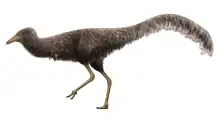

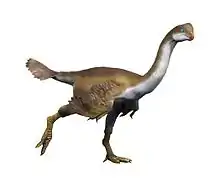
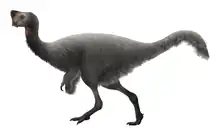
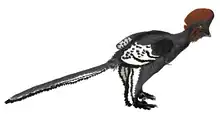


.png.webp)


.jpg.webp)
